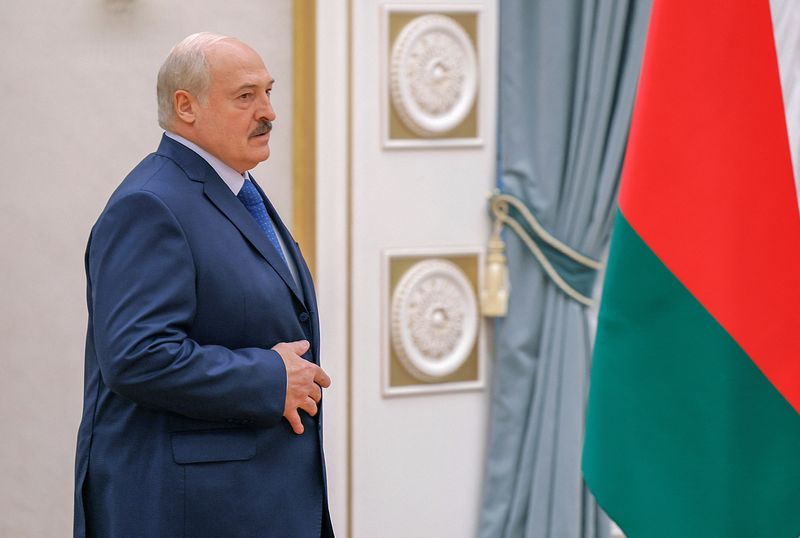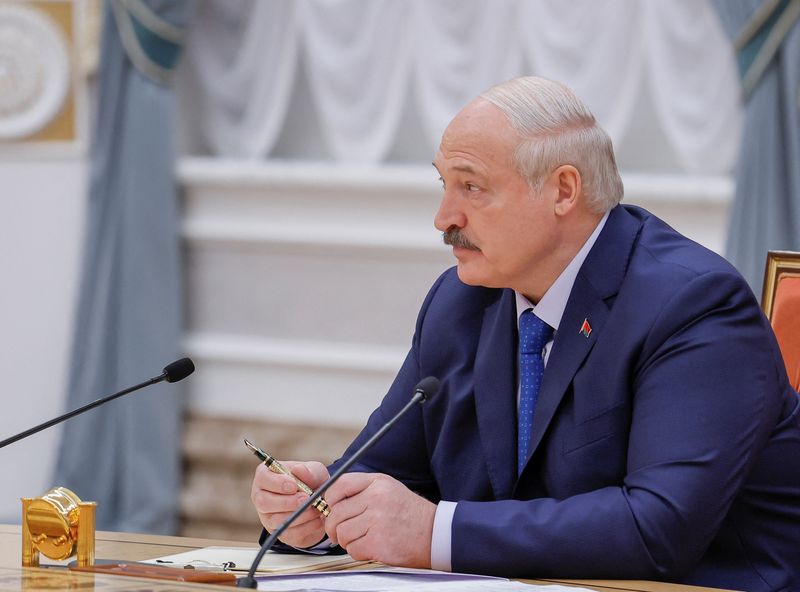By Guy Faulconbridge
MINSK (Reuters) -Belarusian President Alexander Lukashenko said on Thursday that the mutinous chief of Russia's Wagner group was still in Russia with thousands of fighters, but dismissed speculation that President Vladimir Putin would have Yevgeny Prigozhin killed.
Lukashenko helped broker a deal to end last month's mutiny, the gravest challenge to Putin in his 23 years in power, under which Prigozhin was supposed to stand down his mercenaries and move to Belarus in exchange for Putin dropping charges.
But in comments that raised questions about the deal, Lukashenko said Prigozhin and his fighters were still in Russia, and that it was possible they would not move to Belarus.
Lukashenko nevertheless said the deal had been complied with, and that he stood by his offer to host Wagner - a prospect that has alarmed neighbouring NATO countries - and would speak to Putin shortly.
Prigozhin "is not on the territory of Belarus," Lukashenko told reporters in Minsk's vast Independence Palace. "He is in Petersburg ... perhaps he went to Moscow this morning."
Russian security services were presumably keeping a close eye on him, Lukashenko added.
Asked about earlier comments suggesting Putin had wanted to "wipe out" Prigozhin as the mutiny unfolded, Lukashenko said some in the Kremlin had wanted this, but that it would have unleashed civil war.
"If you think Putin is so malicious and vindictive that he will 'wipe him out' tomorrow - to say it in Russian - no, this will not happen," Lukashenko said.
"The fighters of the Wagner group are at their camps - their permanent camps - those where they have been located since they left the front."
Wagner's main camp is in southern Russia, at Molkino near Krasnodar.
Prigozhin had said his mutiny was not aimed at toppling Putin but at settling scores with Defence Minister Sergei Shoigu and Chief of the General Staff Valery Gerasimov. He did not respond to a request for comment.
The 68-year-old Belarusian leader dismissed a question about whether Putin had been weakened by the crisis, but said he did not want to talk about the motivation behind the mutiny.
He said the situation had been so serious at its peak that Belarusian special forces had been ready to fly in to help defend Moscow.
"We, Putin and Lukashenko, allowed the situation to get out of hand - we thought it would all solve itself - but it didn't," Lukashenko said.
He said he had told Prigozhin, using the diminutive of his first name, Zhenya, that "Putin and I will defend Moscow".
PUTIN KEEPING HIS WORD, LUKASHENKO SAYS
Lukashenko said Putin had known Prigozhin for 30 years, and that Wagner had been founded by Russia's GRU military intelligence service and was Russia's best fighting force.
The question of moving Wagner units to Belarus would depend on decisions by the Kremlin and by Wagner, he said, adding that he had spoken to Prigozhin by phone on Wednesday. "Putin is keeping his word."
Lukashenko said Prigozhin and Wagner intended to continue to work for Russia, and suggested that the mercenaries could atone for their sins by fighting on the hardest parts of the Ukraine front.
Wagner spearheaded the attritional nine-month battle for the Ukrainian city of Bakhmut, but Prigozhin repeatedly accused the top brass of corruption and incompetence and cast the June 24 "march of justice" on Moscow as a protest against them.
Russian state TV on Wednesday launched a fierce attack on Prigozhin and said an investigation was still being pursued.
A business jet linked to Prigozhin left St Petersburg for Moscow on Wednesday and headed to southern Russia on Thursday, according to flight tracking data, but it was not clear if he had been on board. It was later tracked flying north again.
If Prigozhin does return to Russia with impunity, it will raise new questions about Putin's authority in the wake of the mutiny.
Putin told Asian leaders this week that the episode had shown Russian society to be more united than ever.
The Kremlin has declined to discuss Prigozhin's whereabouts.
"No, we do not follow his movements, we have neither the ability nor the desire to do so," Putin's spokesman Dmitry Peskov told reporters on Thursday, nevertheless confirming that Prigozhin's departure for Belarus was one condition of the deal.
Lukashenko said Belarus had offered Wagner some disused Soviet-era military quarters, adding: "But Wagner has a different vision for deployment, of course, I won’t tell you about this vision."

Lukashenko also said he did not see a Wagner presence as a risk, but that his army could benefit from Wagner's expertise.
If they came, he said, Wagner would not be used against Ukraine or any other neighbour as long as Belarus was not itself attacked.
